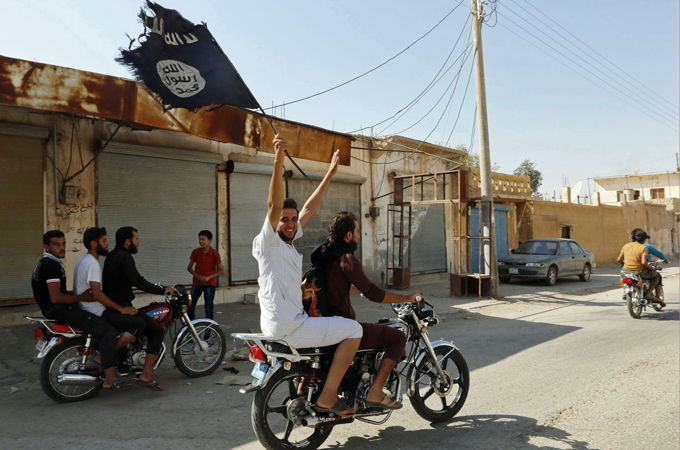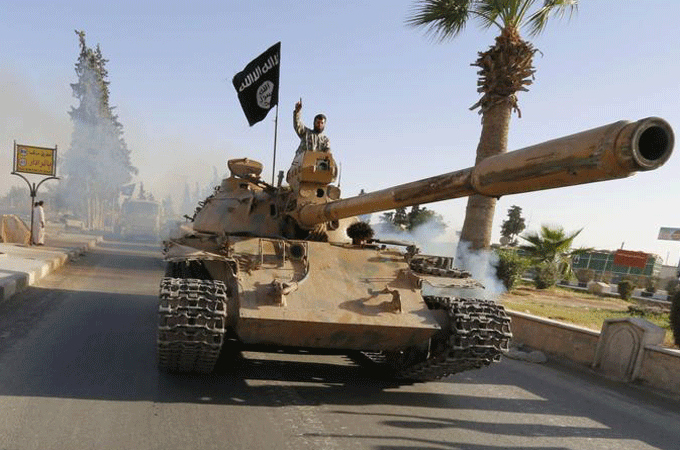Rise of Islamic State in Southeast Asia
Indonesian and Malaysian authorities are keeping a close eye on local supporters of the hard-line Middle East group.

Jakarta, Indonesia – Emilia Az opens a folder on her Blackberry labelled “Wahhabis” and flicks through her recent messages. One is a cartoon depiction of an Arab fighter holding a necklace lined with severed heads. Another is a masked Indonesian man holding aloft the Islamic State flag.
“I get text messages like these all the time now. They have said they know where I live, that I will be killed. They said, ‘If you don’t turn to Sunni, back to the real path of Islam, we will behead you’,” Emilia says.
Keep reading
list of 4 itemsMoscow theatre attack suspects show signs of beating in court
Four men showing signs of severe beating charged over Moscow concert attack
Russia mourns Moscow concert hall attack victims as death toll rises to 137
“Sometimes they throw stones at my house. Once I had a dog, a great dane, and they killed him with a big stone, like they wanted to show me that, ‘I know your house, and we are here’.”
As a Shia Muslim, and a representative for an Indonesian interfaith organisation supporting the rights of religious minorities, Emilia is a visible target for hardline elements of the Sunni majority in the world’s most populous Muslim nation.
The threats against her have so far proved empty, and she’s used to the abuse. But as the Islamic State group (IS) has gained international media attention, the messages she receives have increasingly adopted the sinister imagery of the conflict unfolding in Iraq and Syria.
They have said they know where I live, that I will be killed. They said, 'If you don't turn to Sunni, back to the real path of Islam, we will behead you'.
As many as 200 Indonesian jihadists are believed to have travelled to fight with Islamic State, and Indonesia’s counter-terrorist forces are concerned that those returning could be emboldened to carry out acts of terrorism on home soil.
Pledging allegiance
Abu Bakar Bashir, the imprisoned leader of Jemaah Islamayah (JI), the al-Qaeda-affiliated organisation responsible for the 2002 Bali bombing, pledged his allegiance to the Islamic State group from his jail cell last month.
Security was stepped up last week in central Java at Borobodur, the world’s largest Buddhist temple, following an apparent bomb threat by IS-affiliated Islamists against the UNESCO World Heritage site.
In July, hardliners gathered outside a mosque in Solo, central Java, to publically pledge allegiance to IS leader Abu Bakr al-Baghdadi. Similar gatherings have been reported in Bima, West Nusa Tengarra, and in Jakarta, the capital.
Concerns over resurgent violence are not confined to Indonesia.
Malaysian authorities on August 13 announced the arrest of 19 people who had allegedly planned to travel to Syria to fight alongside IS. The group is also alleged to have planned to bomb a Carlsberg brewery and bars on the outskirts of Kuala Lumpur. So far about 100 Malaysian fighters are believed to have travelled to the Middle East join the group.
Police authorities last week said at least three Malaysian women have travelled to the self-declared Islamic State to serve as “comfort women“, in a phenomenon described as “jihad al-nikah”, or sexual jihad.
In Indonesia, crack anti-terrorist units – trained and funded by the United States and Australia – have, over the past decade, largely eradicated JI’s terrorist network. In the short term, concerns for a large-scale terrorist attack on the archipelago seem premature. But the efficacy of IS’ propaganda, mobilised by social media, has provided a cause around which Indonesia’s hardline elements may rally.
Vigilante justice
The Sunnah Defence League (SDL), an umbrella organisation for Indonesia’s ultra-conservative Muslim factions, has for years demonstrated against practices it deems un-Islamic, from the hosting of the Miss World contest in Bogor last year, to the practicing of other faiths and non-Sunni interpretations of Islam.
Hardline subsects of the SDL – such as the Islamic Defenders Front (FPI) – enforce what they see as a form of vigilante justice: smashing up bars and nightclubs and forcing the closure of churches and mosques of alternative faiths.
 |
| Islamic State supporters wave a flag in celebration after fighters took over a Syrian air base nearby Raqqa city [Reuters] |
FPI spokesman Munarman, who like many Indonesians goes by one name, refused to comment on the organisation’s stance on the Islamic State group when contacted by Al Jazeera, deciding mid-conversation that he was no longer the FPI spokesman.
“You have to understand that jihadist Islam is like a pyramid,” says Andreas Harsono, an Indonesia researcher for Human Rights Watch.
“On the top there are the terrorists who kill, they bring the ‘hard violence’. And below that are the radicals, who do the soft violence, like the FPI. They smash windows, sometimes they kill people but they don’t bomb, they don’t become suicide bombers. And below that are the ones engaged in street protests.”
The Indonesian government claims to have banned the Islamic State group, but there is no legal basis on which someone may be prosecuted for supporting the organisation or its ideals.
Seven men were arrested in Cilacap, West Java, earlier this month for carrying IS flags, but were released within 24 hours.
Firman Hidayat Silalahi, 36, an ice salesman from Depok, south Jakarta, was arrested on August 22 for displaying the IS flag from his balcony. He was later released without charge.
Local community head and neighbour Andri Yudisprana told Al Jazeera that Firman had confronted a crowd gathered outside his house, telling them, “If you’re a Muslim, you must defend this flag”.
Firman was not available when Al Jazeera sought comment at his home.
Symbolism and propaganda
Harsono says IS’ adopted emblem, the Shahada, works as powerful symbol that mainstream Muslims may find difficult to oppose. The Shahada declares the oneness of God and accepts Muhammad as the prophet.
“[Because of this symbolism] it’s very easy to popularise ISIS as an idea,” Harsono says.
 |
| Islamist fighters take part in a military parade along the streets of northern Syria in June [Reuters] |
Since the 1970s, the Saudi royal family has bankrolled the spread of Wahhabism – the ultra-traditional strand of Islam – in mosques and madrasas across Southeast Asia, precipitating a conservative shift in mainstream Sunni Islam throughout the region.
Despite this influence and rising instances of intolerance against religious minorities, Indonesia remains a moderate Muslim nation.
Pancasila, the founding doctrine of Indonesian nationalism, emphasises pluralism and diversity, and strongly opposes the establishment of an Islamic state.
The more centrist Sunni institutions of Muhammadiyah and Nahdlatal Ulama, which collectively boast between 60-70 million members, accept the principles of Pancasila.
But in Malaysia, where to be Malay is inseparable from being Muslim, the Saudi doctrines have gained a stronger hold. While Indonesia’s Shia Muslims suffer intolerance and persecution, in Malaysia the practicing of Shia and other non-Sunni forms of Islam is banned outright.
Many people say Malaysians don't kill each other like Indonesians do. They don't blow themselves up like Indonesians do ... they say it wouldn't happen in Malaysia ... But now I don't know.
Despite being home to large Chinese Buddhist and Christian communities, and other significant ethnic and religious minorities, the lack of interfaith tolerance poses significant worries for Malaysia’s future cohesion.
“You have a dichotomy where Islam is more relaxed, more tolerant, more dynamic and more confident in Indonesia, but at the same time there’s violence on the edges. Maybe it’s in virtue of Indonesia being a democracy now – it’s part of the freedom of speech they’re given,” says Pek Koon Heng, Malaysia-born director of American University’s ASEAN Studies Centre.
“Whereas in Malaysia, we have this increasingly rigid and intolerant form of Islam when it comes to inter-racial relations, but violence is kept out.“
Malaysia’s security forces have enforced a zero-tolerance policy on civil unrest, and would-be jihadists can be detained preventively under the 2012 Security Offences Special Measures Act. But there are concerns that psuedo-totalitarian policing is all that is maintaining a fragile peace.
“Violence would lead to greater disintegration, and if anything happened in Malaysia, the edifice might fall. If some jihadist were to set a bomb in Chinatown [in Kuala Lumpur] the whole fabric could fall apart, because it’s so fragile compared to Indonesia,“ Heng says.
“Many people say Malaysians don’t kill each other like Indonesians do. They don’t blow themselves up like Indonesians do … they say it wouldn’t happen in Malaysia … But now I don’t know.“